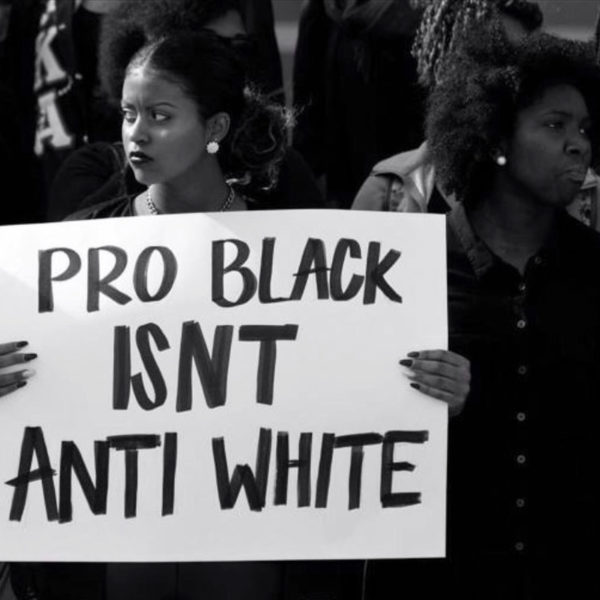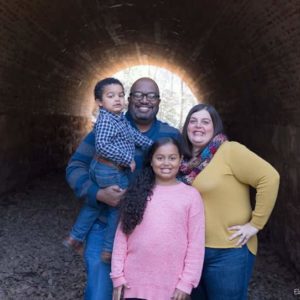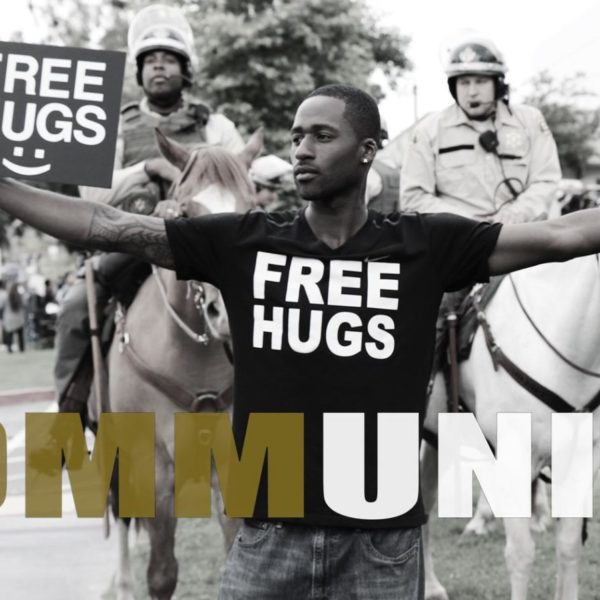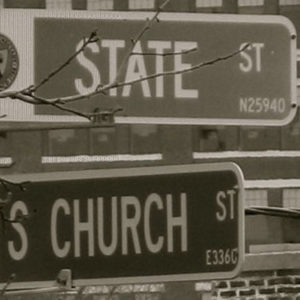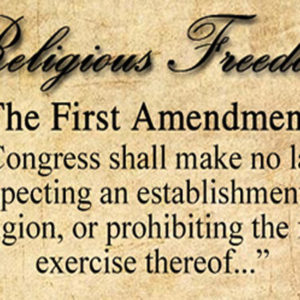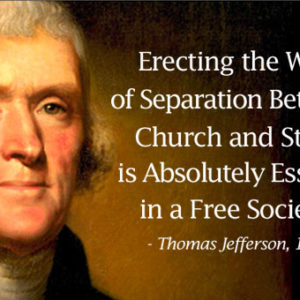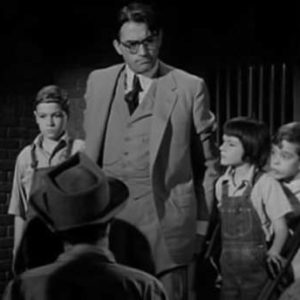Keeping Church and State Separate
Essays in Response to Oklahoma State Question 790
Stating the Problem
Oklahoma State Question 790 is asking citizens to remove Article 2, Section 5, of the Oklahoma Constitution. Article 2, Section 5, reads, “No public money or property shall ever be appropriated, applied, donated, or used, directly or indirectly, for the use, benefit, or support of any sect, church, denomination, or system of religion, or for the use, benefit, or support of any priest, preacher, minister, or other religious teacher or dignitary, or sectarian institution as such.” This set of essays will provide a clear understanding of the issues and an argument why eliminating Article 2, Section 5, would be unbiblical, historically demeaning, legally indefensible, and impractical to implement.
Essay #2
“Historical Response”
Historical Foundation
Religious liberty is the great gift that Baptists have given to the world, while its protector, the separation of church and state, is the American contribution to world history. Christians, and Baptists in particular, have been supporters of both principles. The historical evidence presented gives indication to this statement, as religious liberty and separation between church and state evolve to become a foundation for both Baptist denominations and civil institutions.
In 1640, Roger Williams, founder of the first Baptist church in America and author of The Bloudy Tenent of Persecution for the Cause of Conscience wrote, “An enforced uniformity of religion throughout a nation or civil state, confounds the civil and religious, denies the principles of Christianity and civility, and that Jesus Christ has come into the flesh” (Groves). Williams has been credited with beginning the American movement to embrace genuine religious liberty. His stance regarding personal conscience gave rise to the religious and civic principle of liberty for all to worship, or not to worship, the deity of their tradition.
George W. Truett, pastor of First Baptist Church of Dallas, Texas picked up on this notion and stood on the capital steps in Washington D.C. on Sunday, May 16, 1920, declaring, “There is a vast difference between toleration and liberty. Toleration is a concession; liberty is a right; toleration is a matter of expediency; liberty is a matter of principle; toleration is a grant of man; liberty is a gift of God” (Hobbs, 128). Herein lies the foundation for the principle of religious liberty. Truett is correct in his comparison between liberty and toleration. Liberty is not merely toleration. Liberty is a God granted right that cannot be thwarted by civil or religious authority. Liberty cannot be fully practiced with the watchful eye of ruling authorities ready to pounce upon anything deemed heretical or contrary to popular thought. Liberty is part of the essence of the created being. Therefore, humanity draws from this valuable component of God’s image. Without it, humans become nothing more than drones of the state or ruling magistrates. Religious liberty, in other words, is a gift from the Creator, an unalienable right for all citizens, and the foundational freedom for a healthy democracy.
This precious principle is a Baptist distinctive that has been vocalized and championed over the years. It is biblically rooted in scripture, thus giving it a divine foundation for its purpose and implementation. First, humanity was created by a free God to exist within a free society. Second, no other individual, institution, or authority has the right to coerce religious belief and worship. Third, radical liberty allows the citizenry the right to neglect religion without harm from civil authorities. Individual freedom of conscience is at the core of religious liberty, thus permitting any individual the ability to come under conviction through the Holy Spirit and practice their faith without being required to submit to the dictates of civil magistrates or ruling governments.
Seeds of Religious Liberty in England
Roger Williams and George W. Truett were working from the foundation laid by English Baptists in the 16th and 17th centuries. John Smyth has been described by historians as the first to establish an “identifiable” Baptist church of modern times (McBeth, 32). He did so in 1609, in Holland, after facing sanctions and persecution from the English crown. One of his main reasons for founding the Baptist church was to separate it from the Church of England, which was under the direct authority of the king and magistrates. Smyth and his partner, Thomas Helwys, were staunch supporters of religious freedom and decried the stranglehold the magistrates in England had upon religious practices.
After a parting of ways in 1611, Helwys returned to England and established a church in Spitalfield. He was convinced that no person should have to flee their homeland due to religious persecution (McBeth, 38). Shortly after returning to England, Helwys authored a work entitled, A Short Declaration of the Mistery of Iniquity (1612). In his work, Helwys outlines a position for religious liberty. Baptist historian Bill Leonard suggests, “He (Helwys) maintained that religious liberty was an absolute right not only for Christian dissenters and nonconformists, but also for believer and unbeliever, for heretic and atheist alike” (Leanord, 26). King James the First did not share Helwys’ conviction. Helwys’ bluntness on the matter landed him in Newgate Prison, where he eventually died in 1616.
Colonial Struggles for Liberty
In Colonial America, Roger Williams was banished from the Massachusetts Bay Colony in 1635 because of his stance regarding religious liberty. He left Massachusetts and founded Rhode Island. Leonard remarks, “Williams maintained that God alone was judge of conscience, and the state could not assume religious authority by persecuting either the heretic or the atheist. He (Williams) repudiated the idea of a national church allied with the secular state” (Leonard, 73). Williams’ Rhode Island became the first establishment for religious liberty in Colonial America.
Religious liberty in Rhode Island attracted the likes of Ann Hutchinson and Dr. John Clarke. Hutchinson was banished from Massachusetts in 1638 for her assertion that she had “direct inspiration” from the Holy Spirit (Leonard, 74). Her views on the indwelling of the Holy Spirit led to her expulsion from Boston. Historians also contend the Massachusetts’ civil and religious authorities did not like the idea of a woman having any sort of authority over a man. Hutchinson’s ability to exegete and explain the Scripture baffled many citizens in Massachusetts. Therefore, the male leadership of the area decided if they could not outwit Hutchinson, they would banish her. For the leaders, exhibiting control and power was more important than exploring the Scriptures for a better understanding.
Dr. John Clarke was another supporter of religious liberty who came to Rhode Island searching for freedom. Dr. Clarke contributed to the formation of Rhode Island and traveled to London to request a charter. His appeal would last twelve years, until finally it was granted on July 8, 1663. Historians have claimed that the charter granted to the citizens of Rhode Island established the first purely “secular state” in modern times (Leonard, 76). Religious liberty finally had a place to dwell. Maintaining this sacred right would necessitate some kind of separation between civil and religious leaders.
While religious liberty existed in Rhode Island, in other parts of the colony religious persecution was continuing. Obadiah Holmes, John Clarke, and John Crandall were arrested in Massachusetts for preaching about believer’s baptism. Eventually Holmes was publicly whipped for his part. Mary Dyer was the first woman executed in New England on June 1, 1660 for preaching her Quaker convictions (Leonard, 83). Under the governance of ruling authorities in the Bay Colonies, individuals fleeing persecution from the throne of England landed in America only to discover another oppressor. Baptist and other dissenters’ stories served as essential evidence for the birth of a national policy on religious liberty.
Religious Liberty and the Revolution
More than any other denomination or religious group, Baptists in America were instrumental in lobbying for the inclusion of religious liberty in the American Constitution. Driven by their passion for individual liberty and liberty of conscience, Baptists rallied together to express their position. Isaac Backus and John Leland were leaders in the movement. Each man brought his own convictions and fervor to the debate.
Backus was a New England Congregationalist turned Baptist (Leonard, 123). Born in Norwich, Connecticut, Backus became a Baptist after the death of his father in 1741. Bill Leonard points out that Backus’ life mirrored many other lives in pre-revolutionary America. First, he experienced the First Great Awakening, a spiritual renewal which began in England and crossed over to the Colonies in the early 1700’s. Second, he broke away from his home church, becoming a dissenter to the Puritanism of his youth. Third, he participated in the difficult struggle for religious liberty. Leon McBeth regards Backus as one of the most influential proponents for religious liberty during this era (McBeth, 259). Backus served as a minister for fifty-eight years, writing thirty-seven tracts on theology and was commissioned by the Warren Association to publish a historical work on Baptists (Leonard, 123 and McBeth, 259).
Working on the behalf of the Warren Association’s Grievance Committee, Backus promoted religious liberty in both the General Court of Massachusetts and the first Continental Congress in 1774 (Leonard, 124). Some of the members in that first Continental Congress were so moved by Backus’ stand that they passed a resolution declaring congress’ desire for “civil and religious liberty” granted to every denomination within the land (Leonard, 124). McBeth describes Backus’ efforts for religious liberty as a fight on two fronts; “against the British troops for civil liberty and against establishment legislators for religious liberty” (McBeth, 260).
Through the work of the Grievance Committee led by Isaac Backus, Baptists were well organized to lobby for religious liberty. They preached on the topic of religious liberty and practiced it through their public worship. In addition, they “monitored government legislation to protect the interests of Baptists and others” (McBeth, 262). Led by Backus and the Grievance Committee in 1773, Baptist churches ceased paying church taxes and applying for exemption certificates. Baptists argued that taxes were being used to support local congregations and ministers friendly to the magistrates. Baptists felt this process was unjust and forced citizens to contradict their own religious convictions.
John Leland led the charge for religious liberty and freedom of conscience in the state of Virginia. Leland agreed with Roger Williams that freedom of conscience meant more than mere “toleration” from the magistrates (Leonard, 130). His radical beliefs about freedom were not limited to Christians. He believed people had a freedom to worship God and the right not to worship God. Leland was not a wild-eyed maverick, opposing the state at every turn. He proclaimed individual responsibility by being a good supporter of the state. In his opinion, however, when the state governed from a religious viewpoint or meddled in religious perspective, the state crossed a line and fused with the church. When this happened ideologically or practically, either the state or the church would suffer.
As the Revolution continued to sweep across America, two statesmen took notice that Baptist preachers and congregations were spreading the sacred messages of free conscience and religious liberty. Virginians Thomas Jefferson and James Madison combined their efforts to secure religious liberty for their home state and newly formed American government. Jefferson wrote extensively on his personal philosophy that religious liberty should prevail and that both church and state should be separated.
The metaphor that Thomas Jefferson chose to use in his letter to the Danbury Baptist Association on New Year’s Day, 1802, has been an object of considerable debate (Dreisbach, 24). Ever the master wordsmith and conscious of the rising criticism regarding his refusal to order days of thanksgiving and fasting for the union, President Jefferson thoughtfully constructed an appropriate response to the Connecticut Baptists who championed the president’s stance on religious liberty (Dreisbach, 27).
After seeking input from Attorney General Levi Lincoln and Postmaster General Gideon Ganger, Jefferson composed his final draft to the Danbury Baptists (Dreisbach, 42-47). The correspondence between him and his cabinet members reveals that the president’s main objective for the Danbury letter was to “sow useful truths and principles” among the people. The president’s correspondence and choice of language in the final draft made his intention apparent. President Jefferson clearly expressed his disdain that civil authorities would dictate the conscience of man and wanted the idea of religious liberty to germinate throughout the land.
The President’s use of the metaphor “wall of separation” has caused great difficulty in interpreting the First Amendment. Prior to the Constitution, Jefferson’s adherence to calendaring days of thanksgiving and prayer while Governor of Virginia muddies the waters as to what Jefferson really meant when speaking about the “wall of separation” (Dreisbach, 56). Dreisbach writes that the “wall of separation” between church and state is an eloquent yet misunderstood metaphor. Detractors of separation between church and state argue his “separation” metaphor was specifically meant for Congress and a national church, therefore opening the door for state sponsored endorsements of religion. In addition, those same detractors raise the notion that Jefferson was not even in the country when the Constitution was debated and ratified, as he was an ambassador to France during that time. Finally, some people argue that Jefferson had no intention of creating a civil authority without any religious influence. The wall, in other words, was to keep the state out of the church, not the church out of the state.
The arguments posed by detractors of separation between church and state are worth addressing. When Justice Hugo Black brought Jefferson’s metaphor to the forefront in his opinion regarding Everson v. Board of Education (1947), the adjectives “high and impregnable” were an addendum to Jefferson’s use of the metaphor. Dreisbach argues that Black’s interpretation of the metaphor has grown into Constitutional status (Dreisbach, 125). It clearly is used as a marker for jurisprudence. Yet, the wall to which Jefferson may have been referring is not a wall erected in the style of the Cold War, but that of a retaining wall around a property where neighbors can meet face to face. While there is communication and contact between those on opposite sides of the wall, the wall is never breeched as detractors would like to conclude.
In regard to Jefferson’s appeal for national separation and not state separation, conclusions made by detractors of separation are incorrect. Jefferson’s response to the Danbury Baptists mirrors his progress for religious liberty within Virginia. Jefferson was the author of the Virginia Statute for Establishing Religious Liberty, which became state law in 1786 (Ragosta, 223-224). In the statute, Jefferson made clear his disdain for civil coerciveness regarding the human conscience. His arguments are applicable for both national and state levels.
The idea that the Jeffersonian wall of separation was meant only to keep the state out of the affairs of the church falls short. The concept that the church is somehow the perfect warden of the state is far from reality. The church has a difficult enough job of policing itself. The church does have the benefit of being the conscience of the state – preaching from one side of the wall to the other. Yet, both church and state are well served when the wall is not breeched on an institutional basis. When the institutional church and civil authorities step over the wall, both institutions are in peril.
History details the difficulty society faces when church and state merge. When the authority of the church mingles with the authority of the civil government, the results are disastrous. An extreme example can be seen in the Crusades against Turks and Jihads against the Christian West. Another example can be seen when public school children of other faiths are left excluded as a majority of students offer prayers that are created by the majority faith groups. Church and state suffer when the two are mingled, but ordinary citizens are the true victims of mingling church and state.
Jon Meacham contends that the American Gospel or America’s Good News is truly about the liberation of church and state (Meacham, 5). Religion is able to be the conscience of the state without “strangling” it. Acting as two independent agents, both are allowed to flourish. The state is free from coercive religious dictates, enabling the state’s responsibility to preserve and protect every citizen’s liberty. The church is given liberal freedom to convert humanity through the persuasion of preaching not restricted by civil statute. Without the wall of separation intact, there might be a tendency for one to rule over the other. Religious liberty protects the state from religious dogmatism and enables religion to act freely within society.
In a contemporary setting, many Christian Reconstructionists attempt to “Christianize” the American Revolution of 1776. America was not created to be a Christian nation. The Treaty of Peace and Friendship between the United States and the “Bey” and Subjects of Tripoli of Barbary, passed on June 7, 1776, indicates as much. It clearly states, “the United States of America is not in any sense founded on the Christian religion” (Meacham, 262).
This information does not mean there is no place for religion within the public arena or public expression. America – championing all its citizens, religious or not – is a nation with a tremendous religious background. At almost every meaningful moment within the country’s existence, its leaders have called for prayer. During war and depression, Americans have turned to their creator. The American people have a spiritual characteristic to them that seeks comfort when needed, but without the constraints of civil authorities dictating the conscience. Individual citizens can call for prayer without making government officials high priests for the cause.
The American experiment centers on the message of freedom of conscience and religious liberty. Neither a secular society run amok nor religious fundamentalists’ attempts to force or prescribe strenuous religious dogmas upon the consciences of other citizens must thwart America’s ideals in theory or practice. The biblical principles of religious liberty and the separation of church and state must prevail for the secular state to maintain its objectivity for every citizen and for the church to maintain its influence in a world it seeks to reach with the Gospel.
Church and state issues have recently been heightened in this country. With the rise of the Religious Right and influential gains from strident secularists in American politics, a struggle has emerged over the wall of separation between church and state. Whether to tear it down as the “Right” would like to do, or totally annihilate faith discourse like some secularists would like to achieve, the struggle is growing with each pressing issue. Americans must decide the place of religion within this country. Religion should continue to have a place and the opportunity to thrive, but not at the expense of civil liberties within public life.
Religious institutions must remain free to practice their faith, but faith cannot be allowed to cause harm to innocent citizens. The state should not be allowed to dictate the religious conscience of the church, but must also act for the best interest of the overall citizenship. Religious institutions must maintain the right to believe as their consciences dictate, even if they are deemed wrong by a majority of citizens. The religious institution does not have the right to force belief upon the overall citizenship. For example, many Christians believe in the Holy Trinity. A citizen does not have to believe in the Father, Son and Holy Spirit to run for president, receive social services, or apply for employment in other words, to participate in any civic duty or opportunity. On the contrary, the state does not reserve the right to require churches to set aside convictions. Churches must be allowed to make belief in the Trinity, if they wish, a requirement for employment.
The tension between freedom and religion will always be present. As Thomas Jefferson encouraged, as long as there remains a wall of separation between the two institutions both will thrive. Church and state are two great institutions of this country, but for their greatness to continue they must remain free and separate from one another. Liberty strengthens both church and state. Religious liberty is the great gift of Baptists to the world, while the separation of church and state is the great contribution of America to history. Christians, and Baptists in particular, must remain faithful to both principles.
Conclusion
The historical evidence pertaining to religious liberty and church/state separation clearly suggests that early Baptists and the Founding Fathers felt strongly about this issue. Early English and American Baptists suffered at the hands of the state that was being controlled by the established church. The established church was being funded through public monies, while Baptists and others were being fined, jailed, whipped, and killed for practicing a faith contrary to the established state church.
Therefore, the Founding Fathers, encouraged by Northern and Southern Baptists, adopted a strong stance for religious liberty. However, they knew religious liberty could not truly be protected unless church and state were separated. This wall of separation protected unlawful entanglements between church and state. In the end, the Jeffersonian and Madisonian view of church/state separation in Virginia won the day over Patrick Henry’s establishment arguments.
Now, Oklahoma faces the same question posed in early stages of American’s founding. Will voters’s decide to protect religious liberty by keeping the wall of separation in tact? Or, will the state wade into the murky waters of entanglements, placing religious liberty in danger as the wall of separation comes crumbling down? If history has taught Americans anything, the wall of separation is essential if religious liberty for all citizens is to be law of the land.
___________________________
Dreisbach, Daniel, Thomas Jefferson and the Wall of Separation Between Church and State (Law and American History Series, (New York, NY: New York University Press, 2002).
Groves, Richard, editor, Roger Williams, author, The Bloudy Tenent of Persecution, For Cause of Conscience Discussed in a Conference Between Truth and Peace, (Macon, GA: Mercer University Press, 2001).
Hobbs, Herschel H., and E.Y. Mullins, The Axioms of Religion, (Nashville, TN: Broadman Press, 1978).
Leonard, Bill, Baptist Way: A History, (Valley Forge, PA: Judson Press, 2003).
McBeth, H. Leon, The Baptist Heritage: Four Centuries of Baptist Witness, (Nashville, TN: Broadman Press, 1987).
Meacham, Jon, American Gospel: God, the Founding Fathers, and the Making of a Nation, (New York, NY: Random House, 2006).
Ragosta, John, Religious Freedom: Jefferson’s Legacy America’s Creed, (Charlottesville, VA: Rector and Visitors of the University of Virginia, 2013).

